I have picked some common errors in reasoning which tend to perpetuate around the internet forums, discussions and debates. These are basic fundamentals of logical discourse.
Having ability to logically shape and express our reasoning has many useful benefits including sharpness of thought, confidence and objectivity. This ability can also help us to decide when we should withdraw from the conversation, when it starts to appear as pointless.
Ad Hominem - Abusive Type
It means personally attacking the character of the person that brings the argument, instead of debating the argument alone.
Premise 1 : A is claiming X.
Premise 2: There is something objectionable about A ("A is and idiot").
Conclusion: Therefore X must be false.
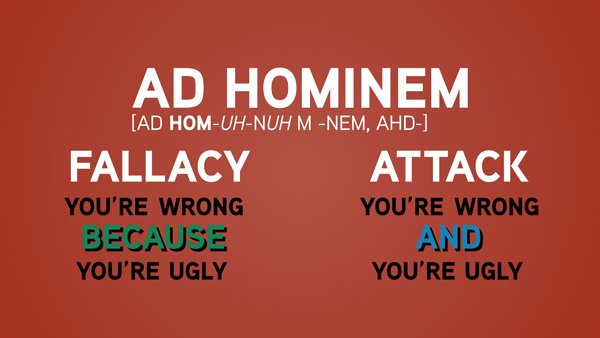
[Picture source]
Slippery Slope (Domino Fallacy)
It is an is a common logical fallacy that suggests that some less important event can produce more important significant event, which then will produce even more important event until some definitive event is reached.
This fallacy presumes that all the following events are inevitable, while providing no evidence to support this clam. This argument tends to exploit people's fears.
Premise 1 : If A, then B,
Premise 2: If B, then C...
Conclusion: ... Then ultimately D.
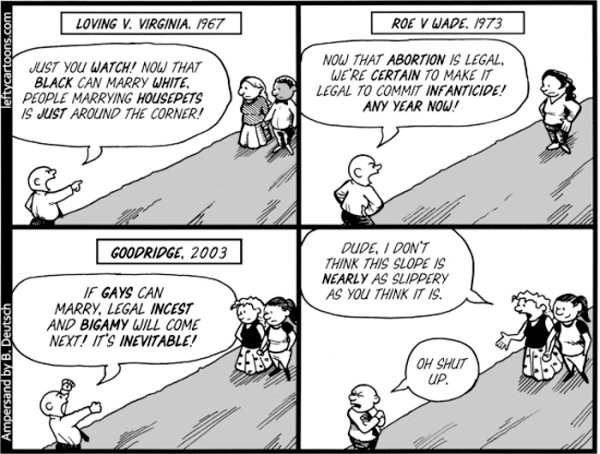
[Picture source]
Circular Reasoning (Begging The Question, Paradoxical Thinking)
A type of reasoning in which a person presumably or definitively assumes the conclusion in one or more of the premises, creating a circle in reasoning.
"You're obviously wrong, because you are making no sense"
Person A: God exists.
Person B: Why should I believe that claim?
Person A: Because the Bible says so.
Person B: Why should I believe the Bible?
Person A: Because the Bible is a word of God.

[Picture source]
Genetic Fallacy
A type of logical fallacy when an argument defended or rejected merely, because the origin of its claim or premise.
For example, claiming that an idea, person or object must be credible (or not credible), just because of its race, ethnicity or geographic background.
This logical fallacy is related to ad hominem fallacy.
Premise 1: Person A said X is true.
Premise 2: Person A is a bad source.
Conclusion: Therefore X must be false.
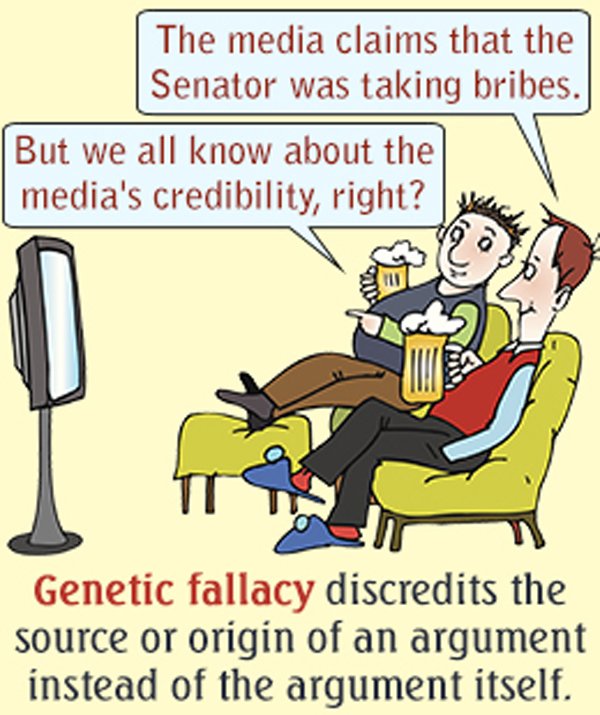
[Picture source]
Argument From Authority (The Appeal To Irrelevant Authority)
Referring to authority as evidence, when the authority is not really an authority who is an expert on the issue.
Irrelevant authority could be a famous person or a source.
This type of logical reasoning tried to exploit the feeling of respect or familiarity with certain popular person or source.
Of course, it is reasonable to appeal to relevant authority like experts in the field.
Premise 1: Experienced people are usually correct.
Premise 2: Those people say X is correct.
Conclusion : Therefore X is definitely correct.

[Picture source]
Red Herring (Changing The Subject, Beside The Point)
It is a deliberate attempt to take an attention from an argument to different issue, with an attempt of discarding the argument.
It is logically fallacious reasoning, because changing the subject of debate does not count as an argument against a claim.
Subject A is being discussed.
Subject B is being introduced which has no relevance to topic A.
Subject A ends up being abandoned.
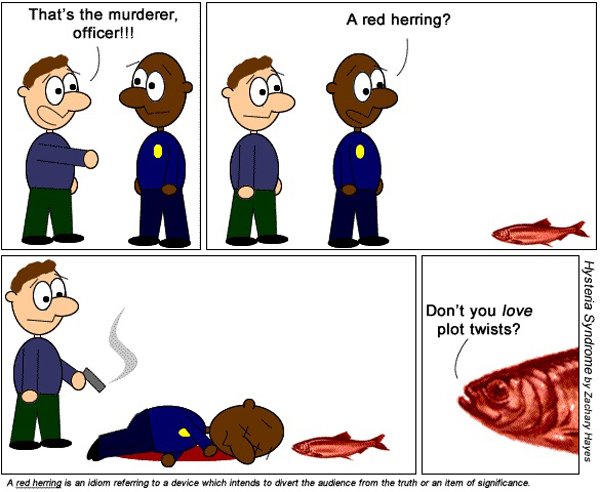
[Picture source]
Straw Man
An attempt to win the argument by creating a misrepresented, twisted or overblown version of the argument and then attacking that substituted version.
It happens when a person deliberately misrepresents an opponent's argument to make the opponent's argument look like it can be easily rejected.
Person A raises argument X1.
Person B describes argument X1 as argument X2 (Straw Man Argument).
Person B refutes argument X2.
Person B claims that argument X1 has been refuted.
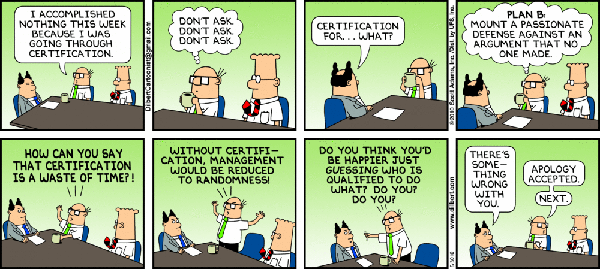
[Picture source]
Appeal To Ignorance (Appeal To A Lack Of Evidence, Negative Proof )
Claiming that some premise must be factual just because there is not enough of evidence proving that it is not, or that a premise must be untruthful, because it has not been proven factual.
"God must exist, because no one has been able to prove that it does not exist"

[Picture source]
Association Fallacy (Guilt By Association)
This logical fallacy occurs when an a person or idea is discredited, because of it's association with some upopular or undesirable group, person or belief.
Premise 1: Person A is a member of group B.
Premise 2: Person A is a member of group C
Conclusion: Therefore B is C

[Picture source]
No True Scotsman
A person can make a universal claim about category of things.
When a claim is confronted with evidence which challenges it, rather than accepting or rejecting the evidence, a person counters the challenge by modifying the criteria of membership into that category, without giving reference to any specific objective rule.
Premise 1: All A are B.
Premise 2: Evidently, not all A are B.
Conclusion: All true A are B.

[Picture source]
I hope that you enjoyed reading my post.
-logic
[For writing this article I used help of different sites such as Logically Fallacious and Rational Wiki ]
Nice post, the strawman is so common. I always encounter affirming the consequent a lot:
if P then Q.
Q is true.
People then wrongly assume P is true.
The either/or fallacy is really common too:
i.e. A person cannot possibly support black lives matter AND police! You have to choose, either you are for police and against black people or for black people and against police!
Downvoting a post can decrease pending rewards and make it less visible. Common reasons:
Submit
Yes. I encounter these fallacies all the time. Especially appeal to authority or ad hominem. YT is the worst. It is very hard to find someone who does not use these there :-)
The one you mentioned about police and Black Lives Matter is an example of false dichotomy (false dillema) fallacy
Downvoting a post can decrease pending rewards and make it less visible. Common reasons:
Submit
Circular Reasoning is indeed a type of logical fallacy, but your example opens the door because it uses a False Strawman.
The argument for Christian Scriptures being infallible is not made in a way that is circular, as you claim:
This is not circular reasoning. It is weighing evidence and finding evidence against Scriptures to be less compelling than evidence for it.
Maybe we should come up with an official name for this form of logical fallacy.
Hmmm. How about "Faux-circular Reasoning Ad-Hominem Strawman"?
It really needs a name, because I hear it all the time and just shake my head.
Downvoting a post can decrease pending rewards and make it less visible. Common reasons:
Submit
It is a good point. I think it is a good topic for article. Maye you could post about it?
Although "Faux-circular Reasoning Ad-Hominem Strawman" sounds maybe bit complicated and too long as defintion :-)
Downvoting a post can decrease pending rewards and make it less visible. Common reasons:
Submit
I thought of another one!
How about "Appeal to the Majority"
I remember my mother used to say, "If everybody else jumped off a cliff, would you jump too?"
As a general rule, the Majority is always wrong.
George Carlin did the mathematical work to back this up:
Downvoting a post can decrease pending rewards and make it less visible. Common reasons:
Submit
Yes, this is one of logical fallacies. They call it "appeal to the people" or "appeal to the bandwagon" :-)
https://en.wikipedia.org/wiki/Argumentum_ad_populum
Downvoting a post can decrease pending rewards and make it less visible. Common reasons:
Submit
These are all very good things to watch out for. I've also seen them abused.
For example: Appeal to Authority.
There really are authorities - experts whose opinions are more credible because of their established expertise.
I love it when I'm discussing something with a rank layman in a field who has Opinion A. I point out that Albert Einstein, Erwin Schrödinger, Neils Bohr, and Stephen Hawking all take the opposite Opinion B.
They respond with, "That's an appeal to authority!" Duh. Yeah!
You correctly added the word "irrelevant" authority. Few do.
Downvoting a post can decrease pending rewards and make it less visible. Common reasons:
Submit
Yes haha I have encountered these kind of conversations :-)
Downvoting a post can decrease pending rewards and make it less visible. Common reasons:
Submit
Logical fallacies are often the best way to convince people. It does not matter why they agree with you just that they agree with you.
Downvoting a post can decrease pending rewards and make it less visible. Common reasons:
Submit
Well it is not very sustainable type of agreement :-)
Downvoting a post can decrease pending rewards and make it less visible. Common reasons:
Submit
An intelligent man would be able to sustain the agreement. =)
Downvoting a post can decrease pending rewards and make it less visible. Common reasons:
Submit
This post has been linked to from another place on Steem.
How to Think Critically to Detect Media Bias and Propaganda by @getonthetrain
Steemit: Good or Bad, Remember We're Building a Society Here! by @sykochica
Learn more about linkback bot
Downvoting a post can decrease pending rewards and make it less visible. Common reasons:
Submit
Its useful to know these for more than just arguments on the internet :)
They are very common in any argument!
Downvoting a post can decrease pending rewards and make it less visible. Common reasons:
Submit
Yes that is true. You enconter them every day, everywhere
Downvoting a post can decrease pending rewards and make it less visible. Common reasons:
Submit
I feel like politics debate are just about that. You don't know how to answer attack the journalists and then we forget the real question.
Very nice and detail post. I hope you get the vote you deserve
Downvoting a post can decrease pending rewards and make it less visible. Common reasons:
Submit
Politics debates are one of the worst. It just a blizzard of logical fallacies.
Thank you for vote!
Downvoting a post can decrease pending rewards and make it less visible. Common reasons:
Submit
Very very interesting! Didn't know about all those kind of fallacies though I sometimes ¨feel¨ it when arguing. I do recognize myself. Better late then never. Knowing it, I'll be more careful ;-)
Downvoting a post can decrease pending rewards and make it less visible. Common reasons:
Submit
Thank you.
I'm glad that this list could help you to understand them better :-)
Downvoting a post can decrease pending rewards and make it less visible. Common reasons:
Submit
great post, gave an upvote.
Downvoting a post can decrease pending rewards and make it less visible. Common reasons:
Submit
Thanks skeptic :-)
Downvoting a post can decrease pending rewards and make it less visible. Common reasons:
Submit
Is it ok if I link to your post when people try to pull this crap on me? xD
Downvoting a post can decrease pending rewards and make it less visible. Common reasons:
Submit
Of course! I have no right to hold knowledge. Neither would I want to :-)
Downvoting a post can decrease pending rewards and make it less visible. Common reasons:
Submit
sweet
Downvoting a post can decrease pending rewards and make it less visible. Common reasons:
Submit
This was a great post @logic! Very well written and easy to digest!
The comics you used were spot on! (especially the red herring)
This is something I truly feel some people are either lacking in general or lose in emotionally driven moments. For humanity to progress, the ability to communicate is logically argue is imperative.
Downvoting a post can decrease pending rewards and make it less visible. Common reasons:
Submit
You are so right. I think that knowledge of logical fallacies is fundamental and should be tought to kids very early in schools. It is like cooking skill :-)
Downvoting a post can decrease pending rewards and make it less visible. Common reasons:
Submit
I have a PDF here with 24 common fallacies. Is part 2 coming too? :D
Downvoting a post can decrease pending rewards and make it less visible. Common reasons:
Submit
If this post is popular I may definitely make part 2 :-D
There are many other fallacies to write about :-)
Downvoting a post can decrease pending rewards and make it less visible. Common reasons:
Submit
Great post man. I can see why you're called logic
Downvoting a post can decrease pending rewards and make it less visible. Common reasons:
Submit
(-:
Downvoting a post can decrease pending rewards and make it less visible. Common reasons:
Submit
Nice comprehensive summary. I think all of us as human beings need to be careful of falling into these traps. I'm sure I've done it many times.
I love your use of cartoons and images too. Stellar work.
Downvoting a post can decrease pending rewards and make it less visible. Common reasons:
Submit
Thanks. I really appreciate your feedback :-)
Downvoting a post can decrease pending rewards and make it less visible. Common reasons:
Submit
Ultimately only my experience right now is true. Words to describe it are false, as too are words used to describe anything that is not going on right now.
Downvoting a post can decrease pending rewards and make it less visible. Common reasons:
Submit
Ttrue. In the end our every experience is subjective and language can never truly describe it :-)
Downvoting a post can decrease pending rewards and make it less visible. Common reasons:
Submit
What a lovely post! Thanks for this!
Faulty logic, or its interpretation at least, seems to cause most of the friction in world societies today, and you have brought forth the logic in a simple way. I would love to see posts such as these trending instead of what is there now. You sir, deserve to be followed!
Downvoting a post can decrease pending rewards and make it less visible. Common reasons:
Submit
Thank you norbu. I'm glad to know that people values this post :-)
Downvoting a post can decrease pending rewards and make it less visible. Common reasons:
Submit
You will surely not run out of ideas for Part II, but one of my favourites, not mentioned yet: post hoc ergo propter hoc. Just because event A preceded event B does not mean that A caused B.
And I encounter very often special pleading: yes, A is true, but with B it is completely different because, because oh look a squirrel!
Downvoting a post can decrease pending rewards and make it less visible. Common reasons:
Submit
Haha I will surely need to add these in Part 2 :-)
Downvoting a post can decrease pending rewards and make it less visible. Common reasons:
Submit
Thanks a lot for this. One can find many examples in everyday life. And cool cartoons :)
Downvoting a post can decrease pending rewards and make it less visible. Common reasons:
Submit
You are welcome :-)
Downvoting a post can decrease pending rewards and make it less visible. Common reasons:
Submit
Nice! I really like this! And i believe you found your "niche" to write on! :-)
Downvoting a post can decrease pending rewards and make it less visible. Common reasons:
Submit
Thank you.
Possibly. It certainly fits my username:-)
Downvoting a post can decrease pending rewards and make it less visible. Common reasons:
Submit
Cool post.
I learned something.
Downvoting a post can decrease pending rewards and make it less visible. Common reasons:
Submit
Haha
Thank you
Downvoting a post can decrease pending rewards and make it less visible. Common reasons:
Submit
Ah, I'm sorry this post didn't make more and get more attention. My favorite site for this stuff is https://yourlogicalfallacyis.com/ So important today. Turn on the TV for 5 minutes and you'll hear a dozen or so fallacies.
Downvoting a post can decrease pending rewards and make it less visible. Common reasons:
Submit
That's ok. Thank you for reading and I am glad that you liked it.
I didn't kow this site. It looks fun. I'm gonna bookmark it. Thanks!
Downvoting a post can decrease pending rewards and make it less visible. Common reasons:
Submit
Great post!
Downvoting a post can decrease pending rewards and make it less visible. Common reasons:
Submit
Thank you! :)
Downvoting a post can decrease pending rewards and make it less visible. Common reasons:
Submit